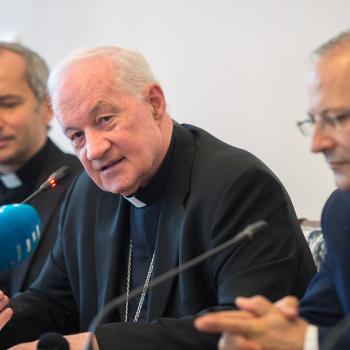“No, no change and no demolishing the dubia… the dubia are authoritative and clearly legitimate”. Cardinal Gerhard Müller, the former prefect of the Congregation for the Doctrine of the Faith, has contradicted himself, yet again, on the question of the interpretation of Pope Francis’ Amoris Laetitia, the apostolic exhortation that opens the door to the reception of communion by the divorced and civilly remarried.
“Unfortunately,” Müller says in a new interview in La Nuova Bussola Quotidiana, “some people always take a ‘partisan’ view [on the openness of Amoris Laetitia to communion for the divorced and remarried], for or against the Pope, as if the Church were a political party”. The cardinal’s preface to the new book by Rocco Buttiglione, Friendly Responses to the Critics of Amoris Laetitia, was, he says, “not meant to continue the polemics but to overcome them, and to speak about these issues theologically. It is not about being right at any cost, but about honoring revealed Truth”.
Not only is Müller incorrect, however, in arguing now that there are “no exceptions” to the ban on communion for the remarried, but in his latest interview he does nothing more than “continue the polemics” and (re)take a position against the Pope and with the dubia cardinals: those prelates that, more than a year ago, formally “questioned” the bishop of Rome as to the orthodoxy of his apostolic exhortation.
The proof is this: that although Müller says now there is “no demolishing the dubia“, he had in fact, in his preface to Buttiglione’s book, not only subscribed “with full conviction” to Buttiglione’s “reasoned and uncontroversial answer to the cardinal’s five dubia“, in his own words, but also answered, in his own terms and in detail, at least four of the “doubts” raised by these cardinals.
The pertinent passages of Müller’s introduction are these:
The doctrine of Veritatis splendor remains valid (art. 56;79) also with respect to Amoris Laetitia (art. 303) for which there are absolute moral norms to which there is no exception (cf. dubium n. 3;5 of the cardinals).
It is evident that Amoris Laetitia (art. 300-305) does not teach and does not propose to believe in a binding way that the Christian in a condition of a present and habitual mortal sin can receive absolution and communion without repentance for their sins and without formulating the intention of not sinning any more, in contrast with what Familiaris consortio (art. 84), Reconciliatio et poenitentia (art. 34) and Sacramentum caritatis (Art. 29) (cf. dubium n. 1 of the cardinals) say.
And:
[…] This does not mean, however, that now Amoris laetitia art. 302 supports, in contrast to Veritatis splendor 81, that, due to mitigating circumstances, an objectively bad act can become subjectively good (it is dubium n. 4 of the cardinals).
In other words, the substance of Müller’s argument in the Buttiglione preface is that:
- Amoris Laetitia does not teach that remarried Catholics can be absolved and admitted to communion without proposing to live in complete continence (answer to dubium 1)
- Amoris Laetitia does not admit of a “creative interpretation of the role of conscience” but instead still recognizes the existence of “objective situation[s] of grave habitual sin”, “absolute moral norms” and “intrinsically evil acts” (answer to dubia 3 and 5); and:
- Amoris Laetitia does not suppose that “circumstances or intentions can never transform an act intrinsically evil by virtue of its object into an act ‘subjectively’ good or defensible as a choice” (cf. Veritatis Splendor 81; answer to dubium 4)
The reasoning Müller adduces for his answers to these four dubia, in his original piece, can be summarized as follows: a), that “there are different levels of gravity depending on the type of sin”; and b), that “for the imputability of guilt in God’s judgment, one must consider subjective factors such as full knowledge and deliberate consent in the serious lack of respect for God’s commandments, which has as a consequence the loss of sanctifying grace and of the ability of faith to become effective in charity” (cf. Thomas Aquinas S. th. II-II, q. 10 a. 3 ad 3).
How then can the cardinal continue to maintain that there is “no demolishing the dubia” – that they are “authoritative and clearly legitimate” – when both he himself, and Buttiglione, have provided what he calls “reasoned and uncontroversial” answers to them? When, too, the answers he himself has provided coincide, in their appeal to St. Thomas Aquinas, with the answers the Pope himself has given to them? (In September, in a question-and-answer session with his fellow Jesuits in Cartagena de Indias, Colombia, Francis said that “I want to repeat clearly that the morality of Amoris Laetitia is Thomist, the morality of the great Thomas”).
That Cardinal Müller should backpedal, once again – by my count this is at least the fourth or fifth time he’s changed his tune on the issue of the pastoral needs of the divorced and remarried – is nothing short of astounding. A cardinal who seems to do little more than pretend “to bring peace to the situation and not fuel polemics between opposing groups” – as he says in his new interview – while fanning the flames of conservative anti-Francis sentiment has no place in the Vatican, let alone as prefect of the CDF. The Pope was certainly right not to renew his term.











